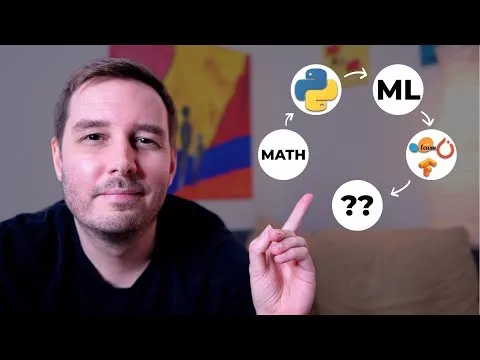
Mathematics for Machine Learning: PCA 
This course provides an intermediate-level introduction to the mathematical foundations of Principal Component Analysis (PCA), a powerful dimensionality reduction technique used in machine learning. Through this course, learners will gain a deeper understanding of PCA and its applications. ▼
ADVERTISEMENT
Course Feature
![]() Cost:
Cost:
Free
![]() Provider:
Provider:
Coursera
![]() Certificate:
Certificate:
No Information
![]() Language:
Language:
English
![]() Start Date:
Start Date:
Self Paced
Course Overview
❗The content presented here is sourced directly from Coursera platform. For comprehensive course details, including enrollment information, simply click on the 'Go to class' link on our website.
Updated in [March 06th, 2023]
This course provides an introduction to the mathematics behind Principal Component Analysis (PCA), a powerful tool for machine learning. It covers the fundamentals of linear algebra, including vector spaces, linear transformations, and eigenvalues and eigenvectors. It also covers the application of PCA to machine learning, including the use of PCA for data preprocessing, dimensionality reduction, and feature extraction.
Mathematics for Machine Learning: PCA is an introductory course designed to provide students with a comprehensive overview of the mathematics behind Principal Component Analysis (PCA). The course begins with an introduction to linear algebra, including vector spaces, linear transformations, and eigenvalues and eigenvectors. It then moves on to discuss the application of PCA to machine learning, including the use of PCA for data preprocessing, dimensionality reduction, and feature extraction.
The course is designed to provide students with a solid foundation in the mathematics behind PCA, as well as an understanding of how to apply it to machine learning. It is suitable for students with a basic understanding of linear algebra, as well as those with no prior knowledge of the subject.
At the end of the course, students will have a comprehensive understanding of the mathematics behind PCA, as well as the ability to apply it to machine learning. They will be able to use PCA for data preprocessing, dimensionality reduction, and feature extraction. They will also be able to identify and interpret the principal components of a dataset.
[Applications]
This course provides an introduction to Principal Component Analysis (PCA) and its application in Machine Learning.
[Suggestions for Application]
Students who have completed this course can apply their knowledge of PCA to a variety of Machine Learning tasks. They can use PCA to reduce the dimensionality of data, improve the accuracy of models, and reduce the computational complexity of algorithms. Additionally, they can use PCA to identify patterns in data and gain insights into the underlying structure of the data.
[Career Paths]
This course provides an introduction to the mathematics behind Principal Component Analysis (PCA), a powerful tool for machine learning. It covers the fundamentals of linear algebra, calculus, and probability theory, and provides an overview of the PCA algorithm and its applications.
1. Data Scientist: Data Scientists use mathematics, statistics, and machine learning to analyze large datasets and uncover insights. They develop algorithms and models to identify patterns and trends in data, and use these insights to inform decisions and strategies. Data Scientists are in high demand, and the field is expected to continue to grow in the coming years.
2. Machine Learning Engineer: Machine Learning Engineers use mathematics, statistics, and machine learning to develop and deploy algorithms and models for a variety of applications. They design, build, and maintain machine learning systems, and use their expertise to optimize performance and accuracy. The demand for Machine Learning Engineers is expected to continue to grow in the coming years.
3. Artificial Intelligence Engineer: Artificial Intelligence Engineers use mathematics, statistics, and machine learning to develop and deploy algorithms and models for a variety of applications. They design, build, and maintain AI systems, and use their expertise to optimize performance and accuracy. The demand for Artificial Intelligence Engineers is expected to continue to grow in the coming years.
4. Research Scientist: Research Scientists use mathematics, statistics, and machine learning to conduct research and develop new algorithms and models. They use their expertise to analyze data and uncover insights, and use these insights to inform decisions and strategies. The demand for Research Scientists is expected to continue to grow in the coming years.
[Education Paths]
This course provides an introduction to the mathematics behind Principal Component Analysis (PCA), a powerful technique for dimensionality reduction and data analysis. It covers the fundamentals of linear algebra, calculus, and probability theory, and provides an overview of the PCA algorithm and its applications.
1. Mathematics Degree: Mathematics degrees provide a strong foundation in the fundamentals of mathematics, including linear algebra, calculus, and probability theory. This degree is essential for those interested in pursuing a career in machine learning, as it provides the necessary skills to understand and apply the algorithms used in machine learning. Additionally, mathematics degrees provide a strong foundation for further study in related fields such as computer science and statistics.
2. Computer Science Degree: Computer science degrees provide a comprehensive understanding of the fundamentals of computer science, including algorithms, data structures, and programming languages. This degree is essential for those interested in pursuing a career in machine learning, as it provides the necessary skills to understand and apply the algorithms used in machine learning. Additionally, computer science degrees provide a strong foundation for further study in related fields such as artificial intelligence and robotics.
3. Statistics Degree: Statistics degrees provide a comprehensive understanding of the fundamentals of statistics, including probability theory, data analysis, and statistical modeling. This degree is essential for those interested in pursuing a career in machine learning, as it provides the necessary skills to understand and apply the algorithms used in machine learning. Additionally, statistics degrees provide a strong foundation for further study in related fields such as data science and predictive analytics.
4. Artificial Intelligence Degree: Artificial intelligence degrees provide a comprehensive understanding of the fundamentals of artificial intelligence, including machine learning, natural language processing, and computer vision. This degree is essential for those interested in pursuing a career in machine learning, as it provides the necessary skills to understand and apply the algorithms used in machine learning. Additionally, artificial intelligence degrees provide a strong foundation for further study in related fields such as robotics and autonomous systems.
The demand for professionals with expertise in machine learning is growing rapidly, and these degree paths provide the necessary skills and knowledge to pursue a career in this field. Additionally, the development of new technologies and applications in machine learning is driving the need for professionals with expertise in this field, making these degree paths increasingly attractive.
Pros & Cons

1. Valuable content and learning outcomes.

2. Part of a specialization series for comprehensive learning.

3. Suitable for learners with strong math and programming backgrounds.

4. Completion provides a sense of achievement and satisfaction.

5. The course has helpful answers and support in the forums.

1. Lack of real-world examples and applications.

2. Ineffective information transfer and course delivery.

3. Assignments poorly constructed and lack context.

4. Insufficient intuition and explanations, heavy reliance on formulas.

5. Requires additional resources and self-learning for better comprehension.

6. Challenging programming assignments without adequate coding help.

7. Difficulty for learners with novice programming background or new to math concepts.

8. Quality and instruction level lower compared to previous courses in the series.
Course Provider

Provider Coursera's Stats at AZClass
Discussion and Reviews
0.0 (Based on 0 reviews)
Explore Similar Online Courses

Public Relations Research

Roadmap to Success in Digital Manufacturing & Design

Python for Informatics: Exploring Information

Social Network Analysis

Introduction to Systematic Review and Meta-Analysis

The Analytics Edge

DCO042 - Python For Informatics

Causal Diagrams: Draw Your Assumptions Before Your Conclusions

Whole genome sequencing of bacterial genomes - tools and applications

How I would learn Machine Learning (if I could start over)

Learn Data Science and Machine Learning on Microsoft Azure

Machine Learning for Everyone
 Related Categories
Related Categories
 Popular Providers
Popular Providers
 Popular Searches
Popular Searches
Quiz
 Submitted Sucessfully
Submitted Sucessfully
1. What is the main purpose of Principal Component Analysis (PCA)?
2. What is the main difference between PCA and Factor Analysis?
3. What is the main advantage of PCA?


Start your review of Mathematics for Machine Learning: PCA